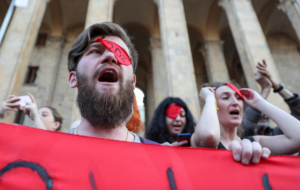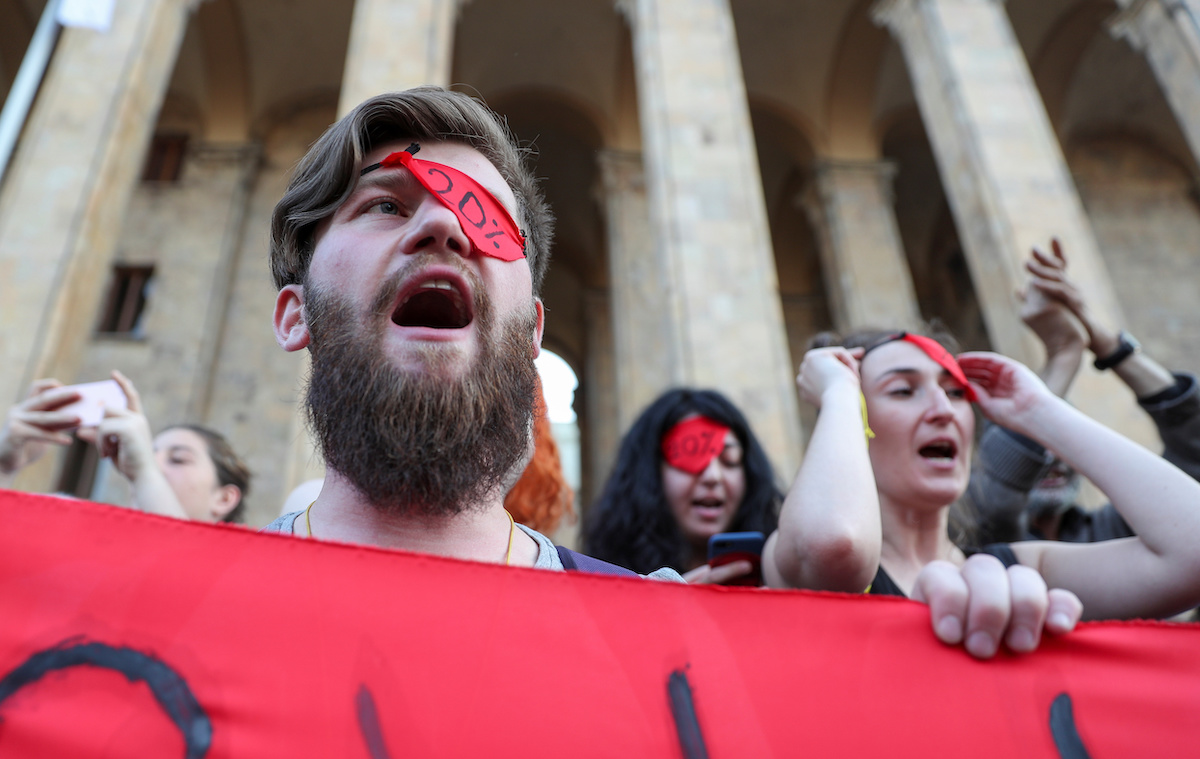Tbilisi protests: Day 14, organisers change strategy
Protests in Tbilisi have been held in front of the Georgian parliament for 14 days straight now.
While in the past three days protests have not been as active as they were in the previous period, organisers say they will not stop until their last demand is met: the resignation of Interior Minister Giorgi Gakharia.
The organisers say the protests will take on a new form, and ‘partisan tactics’ will be used: protesters intend to physically follow the minister in order to create a sense of discomfort for him.

___________________
On July 3, protesters met again at the walls of parliament. They joke, saying they “are going to work”, given it has already become almost a habit.
The protest has developed its own symbols: red eye patches with the inscription “20%”, which serves as a reminder of both that: on June 20 several protesters lost an eye, and that 20 per cent of the territory of Georgia is occupied by Russia.

How and why protests began in Tbilisi
Protests began in Tbilisi on June 20. Thousands of people took to the streets to express their discontent over the arrival of Russian State Duma MP Sergei Gavrilov, who came to Tbilisi to chair at the Inter-Parliamentary Assembly on Orthodoxy.
The indignation of Georgian citizens was caused by the fact that the assembly, which was held in the meeting room of the parliament, was opened in Russian by Gavrilov, who sat in the chair of the speaker.
Thousands of people gathered at the parliament building with one question to the authorities: “How could an MP from Russia take the chair of the Georgian parliament speaker?”
At dawn on June 21, police special forces broke up a rally using rubber bullets and tear gas. More than 200 people were injured, two lost their eyes, and one person is still connected to a respirator from an injury caused by a rubber bullet to the head. The decision to disperse the action was taken by the authorities after one of the opposition leaders called on protesters to occupy the parliament building.
On the afternoon of June 21, Georgian Parliament Speaker Irakli Kobakhidze resigned.
On June 24, the authorities satisfied another demand of the protesters: that the 2020 parliamentary elections be held according to the proportional system.
Now, the main and only requirement of the protesters is the resignation of the head of the Ministry of Internal Affairs, Giorgi Gakharia.
Two weeks after the start of the rally, the organizers thought about changing the form of protest.
On Thursday, July 4, a concert will take place at the parliament, and on Saturday, July 6, a large-scale march is planned in the center of Tbilisi. Starting next week, a “permanent workplace” will be installed near the parliament building.
“Every evening films about the Russian narrative will be shown on a large monitor. Presentations of books, meetings with authors will be held. We will talk about the experience of various countries”, one of the organizers of the event, journalist Giga Makarashvili, said in an interview with RFE/RL.
Makarashvili says the protest will go beyond the area in front of the parliament.
“We will pursue the Minister of the Interior and other officials wherever they are. In addition to the protest, we can apply partisan tactics”, says Makarashvili.
Who are the organisers of the demonstration?
The protests have more than just one organiser. In total, there are some 30 young people – successful media managers, producers, doctors, lawyers, social media managers, journalists, and students. For two weeks in a row, they have come out at seven in the evening to protest – beforehand, they meet to decide on organizational issues.
They do not conceal that they are consulting with representatives of various political parties, but at the same time they assert that they make the agenda and demands themselves, and only cooperate with politicians who recognize this agenda.
“We believe that the government has started a poker game with us. They are waiting for the first blink. The authorities know that Giorgi Gakharia has to leave, since he has become a toxic politician. He has lost legitimacy”, said Shota Digmelashvili, one of the organizers of the protest and the editor of Forbes Georgia magazine, in an interview with Netgazeti.
Another of the organizers, producer Misha Mshvildadze, believes that the two-week protests have brought hope and faith in change to civil society.
“It is of fundamental importance for us that civil society was able to organize such protests. True, there are political parties, but they are not among the leaders. Civil society will not allow the faith of which I spoke to fade”, he said.
Whatever form the protest takes, the demand will remain unchanged, the organisers say:
“The forms may be different. And the protests will differ, but there will be no negotiations with the authorities.”
The response of the authorities and strategy
The government says it will not fulfill the demand of the participants of the demonstration.
Moreover, members of the government and the parliamentary majority say that by dispersing the rally, Minister Gakharia prevented the “implementation of a revolutionary scenario planned by the opposition National Movement.”
The organizers of the rally claim that the authorities have already started persecuting people who regularly participate in the rallies. At least two of those who spoke at rallies said that they lost their jobs only because of their participation at the protest rallies.
One of them was a cleaner, Teimuraz Dzhimshelashvili, and the other was an employee of the Gldani swimming pool, Gia Tsotsoria.
In addition, a serious online campaign is being conducted against the organizers and participants of the demonstration.
A number of videos and articles on Georgian Facebook against the organizers of the protests are being circulated. The fight against them resembles an organized campaign. This has been confirmed by the results of a study conducted by the non-governmental organization Fair Elections. The tactics of the authorities are to present the organizers of the action, young civilian activists, whose average age is 30 years old, as controlled by the former ruling United National Movement party of Mikheil Saakashvili.
Prime Minister Mamuka Bakhtadze has already announced that the authorities are going to create a “Youth Platform”, which will be “under the tutelage of the government”.



















